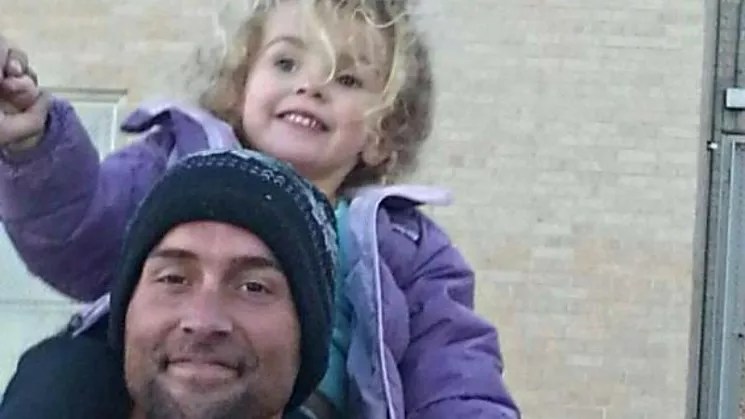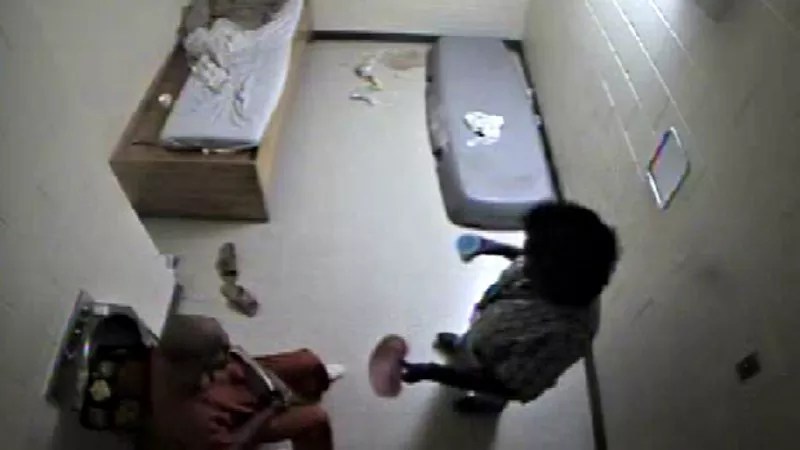
Courtesy of Killmer, Lane & Newman LLP

Audio By Carbonatix
Arapahoe County has agreed to pay $2.45 million to settle a lawsuit over the horrific death of Jeffrey Lillis, 37, and in comments provided to Westword, officials emphasize their determination to both learn from the incident and ensure that the medical care provided to inmates at the jail they oversee is adequate and appropriate. But to attorney David Lane, who represented Lillis’s family in conjunction with fellow lawyers Anna Holland Edwards and Erica Grossman, this statement rings hollow.
In his words, “For Arapahoe County to say they’re committed to quality health care for inmates is abject bullshit. And if they did nothing wrong, why are they paying $2.45 million?”
Lillis had previously struggled with a dependence on heroin, and Holland Edwards, representing the law firm of Holland, Holland Edwards & Grossman, reveals that he was days away from being released to a drug-addiction program before his death on December 14, 2014 – a tragedy captured on video. But Lane, of Denver-based Killmer, Lane & Newman, LLP, stresses that the health crisis that took Lillis’s life “didn’t have anything to do with addiction.” Rather, he died of bacterial pneumonia and sepsis – conditions that weren’t properly addressed, according to the original complaint, accessible below. And Lane offers an anecdote that appears to underscore this point.
“The lead nurse in the case testified in a deposition,” he recalls, “and when I asked her about Jeffrey having sepsis and bacterial pneumonia, I said, ‘You fight those with antibiotics, don’t you?’ She said, ‘Yes.’ Then I looked at the list of medications they gave him, and there weren’t any antibiotics on it, but there was Ibuprofen. So I asked her, ‘Is Ibuprofen an antibiotic?’ And she said, ‘I don’t know.'”
By the way, the lead defendant in the Lillis case was Correct Care Solutions, a company that contracts with facilities such as the Arapahoe County jail to provide health care for inmates. It’s also the frequent target of lawsuits, as we’ve documented in numerous previous posts, including reports about the deaths of Dillon Blodgett, Tomas Beauford, Brian Roundtree and far too many others.
There isn’t a specific mention of Correct Care Solutions in Arapahoe County’s statement about the settlement, but the remarks cast no aspersions on those who were supposed to look after Lillis. It reads:
The death of Jeffrey Lillis from sepsis at the Arapahoe County Jail was a terrible tragedy. Mr. Lillis was receiving medical care at the time; unfortunately, medical staff was unable to determine the cause of his illness.
Arapahoe County prioritizes public safety above all else. Based on what we have learned from this incident, the County is working to ensure that this does not happen again, and we are committed to providing quality health care to inmates while they’re in custody.
The diagnosis and treatment of sepsis can be very difficult, as sepsis frequently masks itself as the flu or a respiratory infection. As a result, it is not uncommon for individuals with sepsis to be misdiagnosed even in emergency rooms and hospitals.

An image from footage that captured Jeffrey Lillis’s final health crisis in Arapahoe County jail.
Arapahoe County via CBS4
Lane’s take? “In their statement, they missed two words. When they wrote that Jeffrey was receiving medical care, they should have added ‘grotesquely substandard medical care.'”
Holland Edwards concurs. “This wasn’t a misdiagnosis, because there wasn’t anybody there to diagnose him,” she says. “There weren’t nurses sitting around saying, ‘Do you think it’s the flu?’ The medical staff was there to prove that he was faking. He got sicker and sicker, but they watched him die on video to prove he wasn’t actually sick.”
“This is the same health-care provider we’ve sued multiple times in many different counties,” Lane adds, “because their agenda is to balance their budget on the backs of helpless inmates by providing no medical care – and if, perchance, somebody dies, they’re willing to pay. To them, ignoring everybody around the country is cheaper than paying a few million dollars in judgments every year.”
If CCS ponied up in this case, no one’s saying. Holland Edwards confirms that all the other claims in the complaint, presumably including the one against CCS, have been resolved, but she’s unable to elaborate.
Last year, Arapahoe County launched a new effort to help prevent opioid withdrawal deaths in jail, and while the program wouldn’t have saved Lillis, Holland Edwards sees it as a small step in the right direction. But she feels many more are needed.
“A major problem around the country is that jails are full of people who are addicted and who suffer from mental illness, or both,” she argues. “These populations need care, not punishment. We need to stop criminalizing addictions and mental illness, and until we do, we’ll have more outcomes like those of Brian Roundtree and Jeffrey Lillis.”
For his part, Lane says, “If Arapahoe County is treating inmates with addictions humanely, that’s a news flash. Good work, Arapahoe County. Now, if you could provide basic medical care to everyone instead of treating them as subhuman scum, it would be even better.”
Click to read the Estate of Jeffrey Scott Lillis v. Correct Care Solutions LLC, et al.